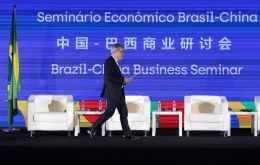MercoPress. South Atlantic News Agency
Economy
-
Friday, October 6th 2023 - 08:45 UTC
Brazil and China conduct a landmark trade operation in Yuan and Reais

For the first time a trade operation between Brazil and China was conducted in a closed-loop system using local currencies, Yuans and Reais, without any involvement of US dollars. The transactions were financed and settled in yuan, directly converted into Brazilian real, without any involvement of the US dollar.
-
Thursday, October 5th 2023 - 10:59 UTC
Brazil reports record trade surplus in September

Thanks to lower fuel imports and improved grain harvest results, Brazil's Ministry of Development, Industry, Trade, and Services this week announced a trade surplus of $8.904 billion for September 2023, a 51.2% improvement over the same month last year, Agencia Brasil reported.
-
Thursday, October 5th 2023 - 09:41 UTC
Inflation in Uruguay within target

Inflation in Uruguay fell again in September for the fifth consecutive month, reaching 0.61% for a year-on-year total of 3.87%, according to a National Statistics Institute (INE) report released Wednesday in Montevideo.
-
Thursday, October 5th 2023 - 09:20 UTC
Blue dollar knows no ceiling in Argentina

The “blue” (a euphemism for “black market”) US dollar closed at AR$ 843 Wednesday after touching AR$ 850 at some point during the day, it was reported in Buenos Aires. The new quotation at the end of the day was AR$ 36 higher than Tuesday's and meant an AR$ 497 increase so far in 2023 after reaching AR$ 346 at the end of 2022. Hence, the new gap with the official exchange rate stood at 141.4%.
-
Wednesday, October 4th 2023 - 10:32 UTC
Uruguay beef exports down 31% in seven months; suppliers are targeting the domestic market with 30% rebates

Beef exports from Uruguay were down 19% in July 2023 compared to last year, according to the Uruguay XXI report. Exports in July totaled US$ 144 million, below the US$ 177 million reached in the same month last year.
-
Wednesday, October 4th 2023 - 10:30 UTC
Brazil to drastically cut dairy imports from Mercosur and ease taxes to promote domestic production

Brazil is planning to curb dairy imports from Mercosur countries. In the next few days, a decree will be published that will change the rules for tax benefits for dairies, agro-industrial companies, and cooperatives that participate in the Ministry of Agriculture’s milk program PMLS. The objective is to reduce tax incentives for companies that purchase dairy products from abroad.
-
Wednesday, October 4th 2023 - 09:55 UTC
Argentina: “Blue” dollar hits new all-time high

The “blue” (a euphemism for “black market”) dollar rose AR$ 10 Tuesday and sold for AR$ 810, thus setting a new record, it was reported from Buenos Aires.
-
Tuesday, October 3rd 2023 - 20:21 UTC
One in ten Scots living in “very deep poverty,” Rowntree Foundation

BBC published a report saying half a million people in Scotland are living in “very deep poverty”, an anti-poverty charity report has found. The Joseph Rowntree Foundation (JRT) said poverty for working people was growing and 10% of employees were in locked in persistent low pay, with women and ethnic minorities most at risk, and 60% of children in poverty have at least one working parent.
-
Tuesday, October 3rd 2023 - 10:20 UTC
China's weaker economy means problems for commodity supplier countries from Latin America

The World Bank cut its economic growth forecast for China for 2024, citing continued difficulties in the domestic market including the property crisis and a fading rebound from the re-opening this year.
-
Tuesday, October 3rd 2023 - 09:59 UTC
Argentina: Digital currency bill will not wait until election day

Argentina's Economy Minister and presidential candidate Sergio Massa announced Monday that he would not wait for the results of the Oct. 22 polls to send to Congress the bill for the creation of the new digital currency he announced during Sunday's electoral debate. “We are going to launch the Argentine digital currency,” Massa told the C5N network.
